| Srl | Item |
| 1 |
ID:
117366
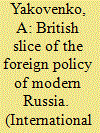

|
|
|
|
|
| Publication |
2012.
|
| Summary/Abstract |
RUSSIA'S FOREIGN POLICY, determined by the President, is carried out on the basis of the Concept of Foreign Policy (last revised: 2008). The concept articulates the following main goals that guide its foreign policy activities, a mega task for which is to aid internal development by foreign policy resources. So it was under Peter I, under Alexander II and so the question stands at present.
|
|
|
|
|
|
|
|
|
|
|
|
|
|
|
|
| 2 |
ID:
069983


|
|
|
| 3 |
ID:
180751
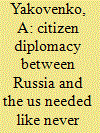

|
|
|
|
|
| Summary/Abstract |
AMID the coronavirus pandemic and an unprecedented presidential campaign in the US, the 60th anniversary of the Russian-American Dartmouth Conference went unnoticed. Yet, it would seem that this time-tested tool of citizen diplomacy, or "Track II diplomacy," is needed now more than ever in the past 30 years. The book Breaking Barriers in United States-Russia Relations: The Power and Promise of Citizen Diplomacy* - written by Philip Stewart, the American co-chair of the Dartmouth Conference, and published in Russian by Aspect Press - is filling this gap. The book is dedicated to Harold Saunders, a former US Assistant Secretary of State instrumental in advancing civil diplomacy, and Yevgeny Primakov, who himself first attended the Dartmouth Conference in 1971 and with whose blessing the event resumed in 2014, after a 24-year hiatus.
|
|
|
|
|
|
|
|
|
|
|
|
|
|
|
|
| 4 |
ID:
174511
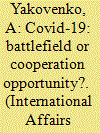

|
|
|
|
|
| Summary/Abstract |
THE PANDEMIC, which from the outset Washington has "promoted" as a "Chinese scourge," was designed to isolate China and put a full stop to globalization as we know it now, a phenomenon seriously affecting all major Western countries, including the U.S. We have witnessed a crisis in relations between Western countries - be it the U.S. and Europe or the European Union.
|
|
|
|
|
|
|
|
|
|
|
|
|
|
|
|
| 5 |
ID:
146289


|
|
|
|
|
| Summary/Abstract |
SUCCESS multiplied by intuition is behind many discoveries. This fully applies to British historian Prof. Gabriel Gorodetsky* who has written numerous scholarly works including The Precarious Truce: Anglo-Soviet Relations, 1924-1927, Stafford Cripps' Mission to Moscow, 1940-1942, etc.
|
|
|
|
|
|
|
|
|
|
|
|
|
|
|
|
| 6 |
ID:
144964


|
|
|
|
|
| Summary/Abstract |
TODAY, our Western partners seem ready to take into account the lessons of Iraq where the ruling Baath party and the army were disbanded during American occupation leaving the ungovernable country. History knows no examples of successful "regime change": disintegration of all (including law and order) structures of state governance is inevitable. Successful "regime change" is a utopia; those who think differently are indulging in dangerous fantasies the price of which is unacceptably high. In the history of Russia abdication of Nicholas II and the Romanov dynasty in 1917 marked the point of non-return. The law and order structures were relieved from the oath of allegiance, disintegration began. European history has its own periods of lawlessness and disorder. Not subjected to large-scale purges the law and order structures remained disoriented; they ceased to exist; the effects are easy to guess: the state was left defenseless in the face of internal and external threats.
|
|
|
|
|
|
|
|
|
|
|
|
|
|
|
|
| 7 |
ID:
137327
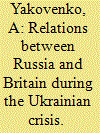

|
|
|
| 8 |
ID:
100185


|
|
|
|
|
| Publication |
2010.
|
| Summary/Abstract |
THE CRUX of the Soviet Union's diplomatic activities from the very first hours of the Great Patriotic War and throughout its duration was to secure a favorable international climate for a resolute rebuff to Nazi Germany's aggression and for defeating the enemy as soon as possible.
Since it was hard to survive the mortal combat we were drawn into and even harder to defeat the cunning and powerful enemy on our own. the most important thing was to find allies to fight together against the German invaders and establish with them effective military, economic and political cooperation for opening the Second Front in Europe and weakening the Nazi Axis powers.
|
|
|
|
|
|
|
|
|
|
|
|
|
|
|
|
| 9 |
ID:
127473
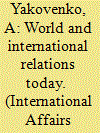

|
|
|
|
|
| Publication |
2013.
|
| Summary/Abstract |
TODAY, when the fifth year of the global financial and economic crisis is drawing to a close, no one has any doubts that the world has entered a period of radical transformation. The crisis of Soviet society and the social system, which brought about an end of the Cold War between the 1980s and the 1990s, has now been supplemented by a crisis of Western society, including a liberal economy and broad representative democracy. So, systemic setbacks in the Euro-Atlantic region - and these two models reflect the collective experience of public development across the space of European civilization, ensuring its domination in the global economy, politics and finances within the framework of a bipolar system - have become key elements of the global crisis. In essence, a line was drawn under a prolonged cycle of historical development that had started with the catastrophe of World War I. And just as the 20th century began in 1914, so it could be argued that the 21st century began with 2008, when the crisis erupted.
|
|
|
|
|
|
|
|
|
|
|
|
|
|
|
|